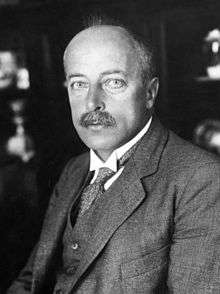
Max von Laue
Max Theodor Felix von Laue (October 9 1879 – April 24 1960) was a German physicist who was awarded the 1914 Nobel Prize in Physics for his discovery of the diffraction of X-rays by crystals.
Quotes
- Though the churches, in general, abstained from interfering officially, the scientific activities of the physicists have always been influenced by their private religious views. The latter, of course, were not necessarily identical with the ecclesiastical doctrines, but the philosophical attitudes of the scientists were affected, at least to some extent, by the prevailing religious thought. Kepler, Descartes, Leibniz, and Newton freely acknowledged this influence; it played a part in the principle of least action in the eighteenth century. After this period, in which Kant's philosophy proclaimed the complete independence of scientific understanding and religious belief, not much more about it is found in physical writings. However, this by no means signifies that the investigational urge of later scientists was not intimately connected with their religiosity. The tenet that the scientific experience of truth in any sense is "theoria," i.e., a view of God, might be said sincerely about the best of them. The search for knowledge without regard to its applicability for use has been "an essential trait of man through the centuries, a sign of his higher origin."
- Max von Laue (1950). History of physics. Academic Press Inc. p. 3-5.
- In the beginning was mechanics.
- Max von Laue (1950). History of physics. Academic Press Inc. p. 15.
External links
This article is issued from
Wikiquote.
The text is licensed under Creative
Commons - Attribution - Sharealike.
Additional terms may apply for the media files.